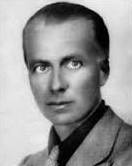Related Research Articles

Giacinto Francesco Maria Scelsi was an Italian composer who also wrote surrealist poetry in French.

Sidney Corbett is an American composer based in Germany.
Michael Denhoff is a German composer and cellist.
Siegfried Palm was a German cellist who is known worldwide for his interpretations of contemporary music. Many 20th-century composers like Kagel, Ligeti, Xenakis, Penderecki and Zimmermann wrote music for him. He was also Rektor of the Hochschule für Musik Köln and Intendant of the Deutsche Oper Berlin.
Philipp Maintz is a German composer.
Heinz Winbeck was a German composer, conductor and academic teacher. He is known for five large-scale symphonies, which he programmatically subtitled, such as "Tu Solus" and "De Profundis". As a composition teacher in Würzburg, he shaped a generation of students.
Iris ter Schiphorst is a German composer and musician.

Graham Waterhouse, cellist and composer especially of chamber music, has written a number of works for string quartet, three major works in several movements, several smaller works and compositions for a solo instrument and string quartet.
Hans Thomalla is a German composer, who has resided in the United States since 2002.
Günter Steinke is a German composer and teacher. He is currently professor of instrumental composition at the Folkwang University of the Arts in Essen, Germany.
Rolf Riehm is a German composer who wrote stage and orchestral works as well as music for ensembles and solo instruments. He began as an oboist and music teacher and was later a professor of music theory at the Hochschule für Musik und Darstellende Kunst Frankfurt am Main for several years.
Günter Neubert is a German composer and tonmeister.
The Strub-Quartett was a well-known German string quartet from Berlin (1929–1945) and Detmold (1945–1965), named after primarius Max Strub.
Christoph Staude is a German composer.
The Petri Quartet was a string quartet that existed from 1889 to 1914 and was based in Dresden. It was named after the primarius Henri Petri, who was the concertmaster of the Dresden Staatskapelle and the Dresden Hofkapelle. After Petri's death, Gustav Havemann took over the leadership and the quartet was renamed "Dresdner Streichquartett der Königlichen Kapelle".
The Philharmonia Quartet Berlin is a string quartet founded in 1985 by members of the Berlin Philharmonic.
The Mendelssohn Scholarship, awarded by the Prussian State from 1879 to 1936, was revived in 1963 by the Prussian Cultural Heritage Foundation. The Foundation awards the Felix Mendelssohn-Bartholdy Prize once a year per competition opened to particularly talented students at one of the 23 recognised music academies in Germany.
Friedrich Schertel was a German cello virtuoso.
Helmut Zapf is a German composer.
The Kairos Quartet is a Berlin-based string quartet founded in 1996.
References
- ↑ Claudius von Wrochem on musikakademie-rheinsberg
- 1 2 "startpage | Kairos Quartet" . Retrieved 7 February 2021.
- ↑ Claudius von Wrochem on adk.de/de/projekte/2018
- ↑ Gans Nackt